Rangahau - Research
Our staff include leading researchers in issues pertaining to Māori and Pacific Development, indigenous studies and culture and language revitalisation. Through our research we provide national and international leadership in Māori, Pacific and indigenous issues and sustainable development.
Centre for Māori & Indigenous Research (CMIR)
The strategic goal of the Centre for Māori & Indigenous Research is to become a centre of research excellence capable of fostering and facilitating the self-determination, self-governance and development efforts of indigenous peoples in New Zealand, Australia, and Pacific rim countries generally.
Its research and development activities are supported through research scholarships and the provision of opportunities for emerging scholars to conduct doctoral and post-doctoral research. The Centre continues to form strategic alliances with relevant research institutions both here and overseas. It also provides an advisory service, and assists in the dissemination and publication of research and development findings. The Centre facilitates academic exchanges, conferences, hui, seminars and convocations.
Staff and students of the Faculty of Māori and Indigenous Studies engage in theoretical and applied research in the core disciplines and inter-disciplinary fields that constitute their primary academic focus. That research is aligned with the government's national goals and is designed to meet the needs and aspirations of those local, national and international communities with which the Faculty identifies in its mission, vision and strategic planning goals and with whose members it maintains an ongoing collaborative relationship. Our research and teaching are integrated and both are designed to contribute to theory, practice, and public policy in New Zealand and around the globe.
Ngā Kaupapa o Te Wā | Current Research Projects
Pacific Climate Change Mobility Research
The research seeks to understand the future scale, pattern and impact (social, cultural and economic) of climate change mobility in the Pacific region, including on Aotearoa New Zealand. Within this, the team will produce new insights on areas such as mobility decision-making, mobility and conflict, cultural, economic and social impacts of mobility, land context, risks and implications, climate adaptation challenges, the role of the church and the role/s of the international diaspora.
Led by Professor Sandy Morrison
Working to End Racial Oppression: WERO
WERO means to provoke, agitate and inspire. Our researchers actively take up the challenge of confronting institutional and interpersonal racism in Aotearoa.
Racism represents one of the most significant challenges facing Aotearoa. The effects of racism are extensive, manifesting in everyday forms of discrimination for Māori, Pacific peoples and minoritised ethnic communities. Entrenched in systems and structures that create disadvantage for minorities, and advantage for privileged ethnic majorities, racism is evident in inequitable outcomes across almost every indicator of wellbeing, including those within health, education, housing, employment and justice.
Science-Lead, Associate Professor Waikaremoana Waitoki
Funded through the Ministry of Business and Innovation Endevour Fund (MBIE)
Learn more about Our People at WERO
Ki te kapu o taku ringa - In the palm of my hand
Led by Professor Tom Roa
This project is focused on photographing wāhi mana (places of significance) such as Kāwhia, Maungatautari Mountain Sanctuary, Mokau, Ōtorohanga, Pirongia and Te Kuiti, asserting a decolonising of the lens. Each photograph is informed by wānanga, mana whenua accounts embedded with local Waikato-Maniapoto narratives as a way to reassert and reclaim mana over ancestral knowledge, landmarks, flora and fauna.
The primary assertion in the book and the exhibition is that the colonial lens is ued to tell that story. Our exhibition and photobook celebrates our use of the photographic lens telling our stories in our way...
Read more About the Book
Rangahau me ngā Whakatinanatanga – University of Waikato
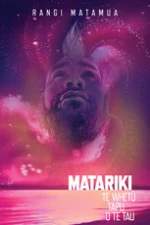 Researchers: Rangi Matamua
Researchers: Rangi Matamua
ISBN: 9781775503262
Keywords: Matariki, Māori, Astronomy
Output Summary
In mid-winter, Matariki rises in the pre-dawn sky, and its observation is celebrated with incantations on hilltops at dawn, balls, exhibitions, dinners and a vast number of events. The Matariki tradition has been re-established, and its regeneration coincides with a growing interest in Māori astronomy. Still, there remain some unanswered questions about how Matariki was traditionally observed. These include:
- What is Matariki?
- Why did Māori observe Matariki?
- How did Māori traditionally celebrate Matariki?
- When and how should Matariki be celebrated?
Based on research and interviews with Māori experts, this book seeks answers to these questions and explores what Matariki was in a traditional sense so it can be understood and celebrated in our modern society.
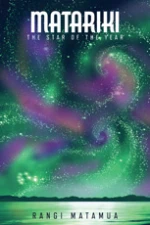 Researchers: Rangi Matamua
Researchers: Rangi Matamua
ISBN: 9781775503255
Keywords: Matariki, Māori, Astronomy
Output summary
In mid-winter, Matariki rises in the pre-dawn sky, and its observation is celebrated with incantations on hilltops at dawn, balls, exhibitions, dinners and a vast number of events. The Matariki tradition has been re-established, and its regeneration coincides with a growing interest in Māori astronomy. Still, there remain some unanswered questions about how Matariki was traditionally observed. These include:
- What is Matariki?
- Why did Māori observe Matariki?
- How did Māori traditionally celebrate Matariki?
- When and how should Matariki be celebrated?
Based on research and interviews with Māori experts, this book seeks answers to these questions and explores what Matariki was in a traditional sense so it can be understood and celebrated in our modern society.
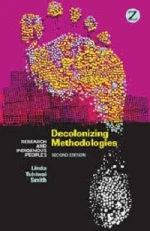 Researchers: Professor Linda Smith
Researchers: Professor Linda Smith
Publisher: Zed Books (2012)
ISBN: 1848139500
Keywords: Imperialism, Colonialism, Hegemony, Indigenous Peoples, Resistance, Emancipation, Research, Methodology, Epistemology, Decolonization, Critical Theory, Postcolonialism, Regimes of Truth.
Output Summary
From the vantage point of the colonized, the term 'research' is inextricably linked with European colonialism; the ways in which scientific research has been implicated in the worst excesses of imperialism remains a powerful remembered history for many of the world's colonized peoples. Here, an indigenous researcher issues a clarion call for the decolonization of research methods.
The book is divided into two parts. In the first, the author critically examines the historical and philosophical base of Western research. Extending the work of Foucault, she explores the intersections of imperialism, knowledge and research, and the different ways in which imperialism is embedded in disciplines of knowledge and methodologies as 'regimes of truth'. Providing a history of knowledge from the Enlightenment to Postcoloniality, she also discusses the fate of concepts such as 'discovery, 'claiming' and 'naming' through which the west has incorporated and continues to incorporate the indigenous world within its own web.
The second part of the book meets the urgent need for people who are carrying out their own research projects, for literature which validates their frustrations in dealing with various western paradigms, academic traditions and methodologies, which continue to position the indigenous as 'Other'. In setting an agenda for planning and implementing indigenous research, the author shows how such programmes are part of the wider project of reclaiming control over indigenous ways of knowing and being.
Exploring the broad range of issues which have confronted, and continue to confront, indigenous peoples, in their encounters with western knowledge, this book also sets a standard for truly emancipatory research. It brilliantly demonstrates that 'when indigenous peoples become the researchers and not merely the researched, the activity of research is transformed.'
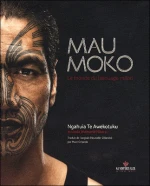 Researchers: Ngāhuia Te Awekotuku
Researchers: Ngāhuia Te Awekotuku
Publisher: Penguin (2011)
ISBN: 9780143566854
Keywords: Moko, tattoo, body art, spirituality, tradition, tikanga, identity, cultural revival
Output Summary
Taia o moko, hei hoa matenga mou . . .
Take your moko, as a friend forever . . .
In the traditional Maori world the moko, or facial or body tattoo, was part of everyday life; everyone had some patterning on their skin. Men wore elaborate designs on their faces; women's were usually less complex but elegant, and both sexes had extensive body work.
After almost dying out in the twentieth century, Maori skin art is now experiencing a powerful revival, with many young urban Maori displaying the moko as a spectacular gesture of ethnic pride and identity.
This hugely popular and magnificently illustrated book, compiled by a group of Maori scholars from the University of Waikato, is the closest there has ever been to a 'complete' book on moko. Mau Moko examines the use of moko by traditional Maori, notes historical material including manuscripts and unpublished, aural sources, and links the art to the present day. It explores the cultural and spiritual issues surrounding moko and relates dozens of stories, many of them powerful and heart-warming, from wearers and artists.
Mau Moko is superbly enhanced by images from early European encounters, traditional Maori representations, and new colour photography commissioned for the book by Becky Nunes.
Tirohia, he moko!
Look, and wonder, at the beauty of this art form . . .
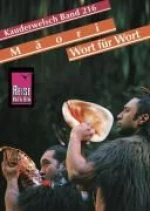 Researchers:
Researchers:
Publisher: Reise (2008)
ISBN: 9783894163259
Keywords: Dictionary, Māori, German, Idiom, Phrases, Translation.